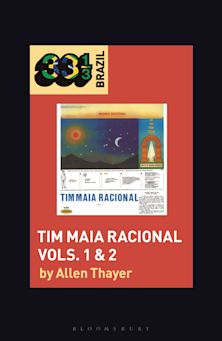The Latin American Songbook in the Twentieth Century
From Folklore to Militancy
The Latin American Songbook in the Twentieth Century
From Folklore to Militancy
Description
The Latin American Songbook in the Twentieth Century: From Folklore to Militancy takes an unprecedented comparative analysis approach to the complex relationship between popular music and culture, society, and politics in Latin America as it relates to representations of national identity. Tânia da Costa Garcia analyzes archival research in Chile, Brazil and Argentina, which have very similar cultural and political processes. This book is divided into two different parts: the first focuses on how the folk studies movement was legitimized in Chile, Brazil, and Argentina; while the second emphasizes the rich history of how the militant song movement in Spanish America was received, transformed, and transmitted to Brazil in the second half of the twentieth century. This book will be especially useful to scholars of Latin American studies, music studies, cultural studies, and history.
Table of Contents
Chapter 1: Folklore, Folk Music and the Constitution of a Mixed-Race National Identity
Chapter 2: The Chilean Folk Songbook: From Música Típica to Nueva Canción
Chapter 3: Folklorizing the Popular: A Resistance Operation Against Cultural Globalization in 1950s Brazil
Chapter 4: The Gaucho, Folklore and the Mass Politics of Juan Domingo Perón
Chapter 5: A Single Songbook for all Argentines
Chapter 6: Neither Country nor City: An Imagined Between-Place for the Argentine FolkSong
Chapter 7: Atahualpa Yupanqui: A Dissonant Note in Juan Domingo Perón’s Folk Songbook
Chapter 8: Art and Revolution: a Comparative Study of the Manifesto do Centro Popular de
Cultura (Manifesto of the Popular Center of Culture) and the Manifiesto del Nuevo Cancionero (Manifesto of the New Songbook)
Chapter 9: The Sounds and Meanings of the Latin American Militant Song in Brazil Under Dictatorship Rule (1970)
Product details
| Published | Aug 27 2019 |
|---|---|
| Format | Ebook (Epub & Mobi) |
| Edition | 1st |
| Extent | 186 |
| ISBN | 9781498571036 |
| Imprint | Lexington Books |
| Series | Music, Culture, and Identity in Latin America |
| Publisher | Bloomsbury Publishing |
Reviews

ONLINE RESOURCES
Bloomsbury Collections
This book is available on Bloomsbury Collections where your library has access.
































